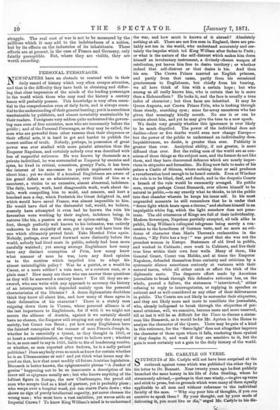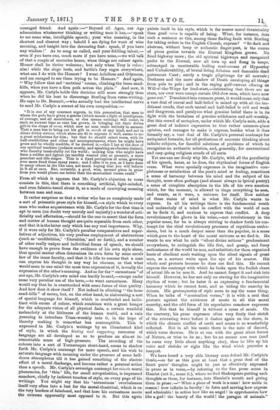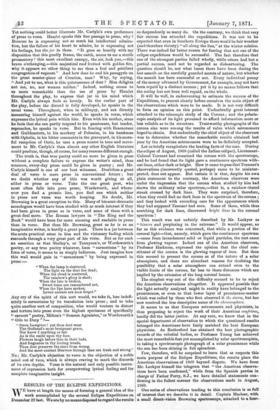MR. CARLYLE ON VERSE.
STUDENTS of Mr. Carlyle will not have been surprised at the outbreak against verse which was published the other day in his letter to Dr. Bennett. Near twenty years ago he first publicly broached the same heresy in his life of John Sterling, whom he strenuously advised,—perhaps in that case wisely,—to give up verse and stick to prose, but on grounds which were many of them equally applicable to all men and without reference to the individual faculty of the man. " Why sing your bits of thoughts, if you can contrive to speak them ? By your thought, not by your mode of delivering it, you must live or die," urged Mr. Carlyle to his die-
oouraged friend. And again :—" Beyond all Ages, our Age admonishes whatsoever thinking or writing man it has,—' speak to me some wise, intelligible speech ; your wise meaning, in the shortest and clearest way ; behold 1 am dying for want of wise meaning, and insight into the devouring fact : speak, if you have
any wisdom I' As to song so called, and your fiddling talent,— even if you have one, much more if you have none,—we will talk -of that a couple of centuries hence, when things are calmer again. Homer shall be thrice welcome ; but only when Troy is taken; alas ! while the siege lasts, and battle's fury rages everywhere, what can I do with the Homers? I want Achilleus and Odysseus, and am enraged to see them trying to be Homers." And again, -" Why follow that sad ' metrical ' course, climbing the loose sand- 'hills, when you have a firm path across the plain." And now, it appears, Mr. Carlyle holds this doctrine still more strongly than when he did his best to discourage Sterling from verse-writing. Ile says to Dr. Bennett,—who actually had the intellectual nerve to send Mr. Carlyle a sonnet of his own composition :— "4 It is one of my constant regrets, in this generation, that men to whom the gods have given a genius (which means a light of intelligence, of courage, and all manfulness, or else means nothing) will insist, in such an earnest time as ours has grown, in bringing out their divine „gift in the shape of verse, which now no man reads entirely in earnest. That a man has to bring out his gift in words of any kind, and not in silent divine actions, which alone are fit to express it well, seems to me a great misfortune for him; but that he should select verse, with its half-credibilities and other sad accompaniments, when he might have prose and be wholly credible, if he desired it,—this I lay at the door of -our spiritual teachers (pedants mostly, and speaking an obsolete dialect), who thereby incalculably rot the world ; making him who might have been a soldier and fighter (so terribly wanted just at present), a mere preacher and idle singer. This is a fixed perception of mine, growing ever more fixed these many years; and I offer it to yon, as I have done to many others in the like case, not much hoping that you will believe in it all at once. But, certainly, a good, wise, earnest piece in prose from you would please me better than the musicallest verses could."
From all which it appears that Mr. Carlyle's objection to verse -consists in this, that there is something artificial, light-minded, -and even falsetto-toned about it, as a mode of conveying meaning between man and man.
It rather surprises us that a writer who has so completely made -a sort of prismatic prose style for himself,—a style which to every
431a11 who makes acquaintance with Mr. Carlyle for the first time is -apt to seem (no doubt very untruly and unjustly) a wonder of arti-
Aciality and affectation,—should be the one to assert that the form and matter of human thought are quite separable from each other, and that it is the latter only which has any real importance. Why, if it were only for Mr. Carlyle's peculiar comparatives and super- latives of adjectives, his very profuse employment of abstractions .such as credibilities," Eternities,' and so forth), and a number -of other really unique and individual forma of speech, we should have enough to prove from the evidence of his own style alone, that special matter often determines its own form by some occult law of the inner faculty, and that it is idle to assume that a man -can express his thought in any way he chooses, or that what would seem to one mind the most true expression of it, is really the expression of the other's meaning. And as for the " earnestness " of -our age, Mr. Carlyle's own mind can hardly be said,—except under some very peculiar use of the term,—to want earnestness. Many would say that he is overstocked with some forms of that quality. And how does it show itself ? Not indeed in climbing " the loose " of metre, but, on the other hand, in elaborating a sort of special language for himself, which is overloaded and indis- tinct with excess of colour, which combines with a great hunger for the adequate vision of all physical facts, a certain wrathful melancholy at the littleness of the human world, and a vain
_yearning to introduce Titan-worship into it, in the hope of thereby making it somewhat less contemptible. This is expressed in Mr. Carlyle's writings by an illuminated kind of style, in which the hinting and suggesting resources of language are all developed so as to produce an almost in- -conceivable sense of high-pressure. The crowding of the
-colours into a sort of Turneresque short-hand, seems to shadow forth Mr. Carlyle's contempt for mere speech, and his wish to saturate language with meaning under the pressure of some half- dozen atmospheres till it has gained something of the electric effect of a moral discharge, and become rather a personal action
than a speech. Mr. Carlyle's sovereign contempt for minute moral phenomena, for ' thin ' life, for small scrupulosities, is impressed
somehow, chiefly by indirect touches of style, on every page of his writings. You might say that his earnestness' overbalances itself very often into a lust for the moral-theatrical, which is on the very borders of falsehood, and that here his earnestness meets the extreme apparently most opposed to it. But this again
paints itself in his style, which is far nearer moral theatricality than good verse is capable of being. What, for instance, does
such a sentence as this, among those finding fault with Sterling for taking orders in the English Church, express? "So dark and abstruse, without lamp or authentic finger-post, is the course of pious genius towards the Eternal Kingdom grown. No fixed highway more ; the old spiritual highways and recognized paths to the Eternal, now all torn up and flung in heaps, submerged in unutterable boiling mud-oceans of Hypocrisy and Unbelievability, of brutal living Atheism and damnable dead putrescent Cant ; surely a tragic pilgrimage for all mortals ; Darkness and the mere shadow of Death enveloping all things from pole to pole ; and in the raging gulf-current offering us Will-o'-the-Wisps for load-stars,—intimating that there are no stars, nor ever were except certain Old-Jew ones, which have now gone out." Translated into common prose, it would mean only that a vast deal of unreal and half-belief is mixed up with all the tra- ditional creeds, that such unreal and half-belief is evil and weak and dangerous, and paralyzes what genuine belief there is in its fight with the brutalism of genuine selfishness and self-worship. But this crowd of metaphor, under which Mr. Carlyle sails, adds a great deal of indirect expression to that rather common-place opinion, and manages to make it express, besides what it does formally say, a vast deal of Mr. Carlyle's personal contempt for antiquated formulas, for all professions of accurate thinking about infinite subjects, for fanciful solutions of problems of which he recognizes no authentic solution, and, generally, for conventional and easy-going religious creeds of all sorts.
Yet one can see dimly why Mr. Carlyle, with all the peculiarity of his speech, hates, as he does, the rhythmical forms of English verse. What verse specially expresses is the imaginative com- pleteness or satisfaction of the poet's mind or feeling, sometimes a sense of harmony between his mind and the subject of his thought, more often perhaps (and almost always in lyrical poetry) a sense of complete absorption in the life of his own emotion which, for the moment, is allowed to tinge everything he sees, and create, as it were, a universe for itself. Now neither of these states of mind is what Mr. Carlyle wants to express. In all his writings there is the fundamental wrath and melancholy of a mind in conflict with the world of men as he finds it, and anxious to express that conflict. A deep revolutionary fire glows in his veins,—not revolutionary in the popular sense, for he is always striving to shadow forth his con- tempt for the chief revolutionary processes of republican enthu- siasm, but in a mach deeper sense than the popular, in a sense which goes to the heart of the moral universe as we find it. He wants to see what he calls "silent divine actions" predominant everywhere, to extinguish the idle fret, and gossip, and fussy enthusiasms of the world he sees, and substitute for them organized hosts of obedient souls waiting upon the silent signals of great men, as a servant waits upon the eye of his master. His whole soul protests because he does not find this. He cannot express the contempt with which he looks upon the foolish chaos of actual life as he sees it. And he cannot forget it and sink into himself. However, he has not only no craving for the imaginative rhythm of verse ; but he hates it as expressing a fundamental harmony which he cannot hear, and as hiding the anarchy he detests. His grotesqueries of style seem to say the same thing. When he talks of "musicallest verses," it is with a soul that protests against the existence of music in all this moral anarchy, and the odd form of his superlative somehow expresses this. Not that be himself is without a sense of music. On the contrary, his prose expresses often very finely that shriek of the retreating wave before it dashes again on the shore, in which the chronic conflict of earth and ocean is so wonderfully reflected. But in all his music there is the note of discord, which verse drowns. He is at one with the great silent forces of Nature, or tries to be so ; but he no sooner sees man (and he cares very little about anything else), than he lifts up his voice and shrieks or sighs like the wind which precedes a tempest.
We have heard a very able literary man defend Mr. Carlyle's thesis,—so far as this goes at least that a great deal of the finest poets' thoughts might be just as effectively expressed in prose as in verse,—by referring to the fine prose scene in Hamlet (act ii., scene where we find Shakespeare putting such thoughts as these, for instance, into Hamlet's mouth and giving them in prose :—" What a piece of work is a man I how noble in reason! how infinite in faculty ! in form and moving how express and admirable! in action how like an angel! in apprehension how like a god 1 the beauty of the world 1 the paragon of animals."
Yet nothing could better illustrate Mr. Carlyle's own preference of prose to verse. Hamlet speaks this fine passage in prose, why ? Because he is expressing not so much his intellectual admira- tion, but the failure of his heart to admire, he is expressing not his feelings, but the jar in them. "It goes so heavily with my disposition that this goodly frame, the earth, seems to me a sterile promontory 1 this most excellent canopy, the air, look you,—this brave o'erhanging,—this majestical roof fretted with golden fire, why it appears no other thing to me than a foul and pestilent congregation of vapours." And how does he end his panegyric on the great master-piece of Creation, man? Why, by saying, "And yet to me, what is this quintessence of dust ? Man delights not me, no, nor woman neither." Indeed, nothing seems to us more remarkable than the use of prose by Hamlet throughout the play, to express that jar in his mind which Mr. Carlyle always feels so keenly. In the earlier part of the play, before the discord is fully developed, he speaks in the usual verse. Throughout, when in soliloquy, and not directly measuring himself against the world, he speaks in verse, which expresses the lyrical pain within him. Even with his mother, since he feels that she can partly respond to his passionate, but tender, reproaches, he speaks in verse. But in fencing with Rosencranz and Gnildenstern, in his mockery of Polonius, in his harshness with Ophelia, in his bitter comments in the graveyard, in his scorn- ful reception of Osric, he uses a prose nearer in tone and move- ment to Mr. Carlyle's than almost any other English literature could produce, though, of course, for many reasons different enough.
The truth is, that true poetry could no more be given in prose without a complete failure to express the writer's mind, than common, every-day prose could be given in poetry ; and Mr. Carlyle himself is one of our best witnesses. Doubtless a great deal of verse is mere prose in conventional fetters ; but we doubt whether any of this was worth giving at all, either in prose or verse. Take the one great poet, who most often falls into pure prose, Wordsworth, and where- ever you find a prosaic line, you find one which neither in prose nor verse was worth keeping. No doubt, Mr. Browning is a great exception to this. Many of his semi-dramatic monologues would have been studied with as much interest if they had been given in prose as in verse, and some of them with a great deal more. The Roman lawyers in " The Ring and the Book" would have been far more amusing and readable in prose than in verse. But then Mr. Browning, great as he is as an imaginative writer, is hardly a great poet. There is a jar between the acute practical sense in him and the visionary feeling which resounds through a very great part of his verse. But as for such an assertion as that Shelley's, or Tennyson's, or Wordsworth's poetry, or any true poetry whatever, loses " earnestness " by its form of verse, it seems to us simply ludicrous. Just imagine how this wail would gain in " earnestness " by being expressed in prose :—
"When the lamp is shattered,
The light on the dust lies dead ; When the cloud is scattered, The rainbow's glory is shed ; When the lute is broken, Sweet tones are remembered not, When the lips have spoken, Loved accents are soon forgot."
Any cry of the spirit of this sort would, we take it, lose indefi- nitely in earnestness by its translation into prose ; and to take quite another sort of composition, who would venture to distort and torture into prose even the highest specimens of specifically " earnest" poetry, Milton's " Samson Agonistes," or Wordsworth's " Ode to Duty " ?— " Stern Lawgiver ! yet thou dost wear
The Godhead's most benignant grace, Nor know I anything so fair As is the smile upon thy face.
Flowers laugh before thee in their beds, And fragrance in thy footing treads, Thou dost preserve the stars from wrong, And the most ancient Heavens through thee are fresh and strong."
No; Mr. Carlyle's objection to verse is the objection of a noble mind out of tune, which is always craving to mark the discords of its own depths. Verse is the natural and only possible instru- ment of expression both for overpowering lyrical feeling and for complete imaginative insight.
































 Previous page
Previous page